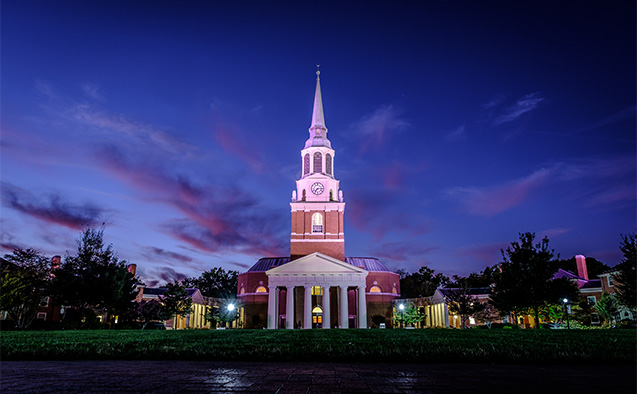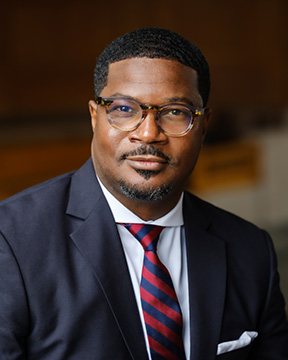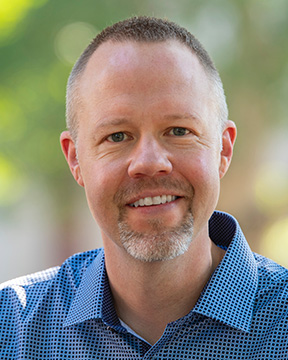Wait Chapel expands programming, strengthens community

Highlights
- A new vision is planned for Wake Forest’s iconic Wait Chapel, which has helped generations both celebrate and mourn together.
- Programs are being planned for Wait Chapel, which embrace diverse traditions and engage people across campus and in the Winston-Salem community.
Wait Chapel, Wake Forest University’s most iconic building, has hosted religious services, academic ceremonies, concerts, lectures, weddings and other events for more than 60 years. Jonathan Lee Walton, who joined the University in 2019 as Dean of the Divinity School and the inaugural Dean of Wait Chapel, is working diligently to ensure its continued relevance.

Jonathan Lee Walton
Through collaborations on and off campus, Walton is implementing programming to bring more vibrancy to the building that’s situated near the center of campus.
Walton and Vice Dean of Faculty Development & Academic Initiatives and Professor of Worship and Liturgical Theology Jill Crainshaw want students, faculty, staff, alumni, city residents and others to come to the chapel for engaging, meaningful activities and programs.
“We’re intentional with each generation of students,” Walton said. “We understand that Wake Forest as a community is different today in 2021 than it was in 1962, 1981 or even 2001. Thus, we want the chapel to be an active site of engagement in the present, which means that we must both affirm tradition and expand our creative reach.”

Jill Crainshaw
Crainshaw began working at Wake Forest in 1999, when the School of Divinity first opened.
“While the geography of our campus has shifted and centralized Wait Chapel, we have a chance to fill it with something we hope is emblematic of what that centering energy is,” Crainshaw said. “I walk through the chapel virtually every day, and I pause and hear those historical voices speaking to me. I think it’s really powerful when a space like that can have intellectual engagement and spiritual formation because we too often separate those out.”
A lauded history
The chapel has seen its share of dignitaries, including U.S. presidents, Martin Luther King, Jr., Elie Wiesel, Hillary Clinton, James Earl Jones, Sandra Day O’Connor, Hank Aaron, Maya Angelou and many others. It is where students, faculty and staff gathered on Sept. 11, 2001, to grieve together after the Twin Towers, the Pentagon and a field in Shanksville, Pennsylvania, were the locations of terrorist attacks that claimed just under 3,000 American lives.
Wait Chapel was also the venue, on a snowy day in February 2020, where former Wake Forest President Nathan O. Hatch apologized for the University’s participation in and benefit from the institution of slavery.
The chapel has been a place for an array of events for students, faculty, staff and the community. Crainshaw agrees it has potential to expand its reach and is glad she and others involved with planning its events and programming are being more intentional about those possibilities.
Diverse worship for a diverse community
To that end, diverse worship traditions are being woven together to create programs, and services are being held during big Wake Forest moments like Family Weekend and Homecoming.
“Spiritual communities can help to expand our moral imaginations. This is one way that we learn to live together and celebrate differences. Wait Chapel must strive to be such a community.” Jonathan Lee Walton
“To look out across Wait Chapel on a Sunday morning and see multiple races and ethnicities and choral students and football players all in the same sanctuary together made me think we were getting something right,” Walton said of the Family Weekend service at which he preached.

Christopher Gilliam
Sacred music is an instrumental part of the chapel. Before joining Wake Forest in 2020, Christopher Gilliam, director of choral activities and an assistant professor in the Department of Music, directed the Winston-Salem Symphony and Symphony Chorus in a 2019 performance of the Mozart Requiem in Wait Chapel. He likes the musical metamorphosis the chapel is undergoing.
“Dean Walton made it possible for me to collaborate with Chaplain Tim Auman for Lovefeast 2020, and he later hired the North Carolina Baroque Orchestra to prepare for the Easter service,” Gilliam said. “He’s stayed true to his word that he really wants to reignite the chapel, and he’s looking for worship service opportunities to involve the choirs.”
The Winston-Salem State University Singing Rams will perform at Lovefeast on Dec. 5 along with the Wake Forest Gospel Choir, directed by Joshuah Brian Campbell, a Grammy- and Oscar-nominated composer. The public is invited to enjoy Lovefeast via livestream here.
Wake Forest’s Concert and Chamber choirs will also perform at Lovefeast. Crainshaw said she’s excited over the collaboration between Campbell, Gilliam and Maestra D’Walla Simmons-Burke, director of Choral and Vocal Studies in the Department of Music at WSSU. WFU’s Gospel Choir and WSSU’s Singing Rams will perform four selections together during Lovefeast.
Grammy, Oscar-nominated professional directing the Gospel Choir
Campbell served as an artist-in-residence at Wake Forest during Spring 2021, working for several weeks with students and alumni of both the Gospel Choir and the Divinity School for the annual Easter service. He returned to work with Gilliam for the undergraduate commencement at Truist Field in May. Since joining the Wake Forest staff in August, Campbell has worked with Crainshaw and the worship planning team to develop weekly worship services at the School of Divinity in Davis Chapel, and has led the Gospel Choir with music inspired by the African American sacred tradition.

Joshuah Brian Campbell
“Finding our voice in the context of Wait Chapel has been and will be an interesting and invigorating challenge. We want to enliven the space with our honesty, which in turn will allow those who gather there to be met right where they are, no matter the tradition or vantage point from which they approach the space.”
Campbell added that he, Crainshaw and others “are excited about pushing the boundaries of what these spaces of worship and gathering can be” as they also engage the spaces pedagogically.
Gilliam said the hiring of Campbell demonstrates Walton’s commitment to “making sure Wait Chapel is active in the music of various genres.” He added that the Chamber Choir rehearses in Wait Chapel because Walton “wants people to hear music when they’re walking by and to know that Wait Chapel is very much alive.”
Intentionality and collaboration are key, Gilliam said, to getting more people engaged with Wait Chapel, where strong collaborations have been developed with several organizations, including the Office of the Chaplain, Wake the Arts and the North Carolina Black Repertory Company.
“I think what we do in Wait Chapel can enliven the work of many people on our campus who get excited about this collaborative effort … sacred music and intellectual events that happen in this space and further advance the University’s mission and purpose,” Crainshaw said.
For example, on Nov. 4 as part of the Mac Bryan Prophetic Preaching Series, hundreds of people came to the chapel to hear Cornel West, a renowned philosopher, author, activist and academic. And in February, March and April 2022, the N.C. Black Repertory Company will stage readings of three new plays for the community inside Wait Chapel. A service will be held in Wait Chapel on Easter Sunday, April 17, 2022, and a variety of other events are being planned.
Added Walton: “We’re in an era where people are becoming more individualized in their spirituality. That’s fine, but we all need community.”
Categories: University Announcements
Wake Forest News
336.758.5237
media@wfu.edu
Meet the News Team
Headlines
Wake Forest in the News
Wake Forest regularly appears in media outlets around the world.




